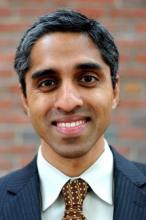If confirmed as the next surgeon general, Dr. Vivek Murthy said that he plans to focus on combating obesity, reducing disease from tobacco use, and rolling back the resurgence of vaccine-preventable diseases.
The noncontroversial set of public health goals runs contrary to the activist stance Dr. Murthy, a Harvard Medical School instructor and hospitalist, took as cofounder and president of Doctors for America, an organization that strongly advocated for the passage of the Affordable Care Act.
"I see my primary role as education," Dr. Murthy said Feb. 4 during questioning by the Senate Health, Education, Labor, and Pensions Committee.
If he becomes surgeon general, his focus will be on building local coalitions among government, business, and faith-based organizations to address public health issues ranging from food deserts to mental health stigma, Dr. Murthy repeatedly told senators.
He received relatively light questioning from Republicans on the committee during the 90 minute hearing, with Sen. Mike Enzi (R-Wyo.) noting that Dr. Murthy was likely to win confirmation regardless of GOP opposition since Senate rules now require only a majority to agree to bring up votes on presidential nominees.
However, some senators did raise concerns that Dr. Murthy was far more political than previous nominees and that he lacked sufficient public health experience. Sen. Lamar Alexander (R-Tenn.), the ranking Republican on the committee, said it would be hard for Dr. Murthy to be a credible advocate for reducing obesity if he also used his office to promote more controversial issues like gun control.
But Dr. Murthy pushed back on both issues. He pledged not to use the bully pulpit of the surgeon general to advocate for stronger gun control. The role of the surgeon general is to be a public health educator, "not a legislator or a judge," he said.
He also defended his experience, saying that he brings a useful perspective as a physician, researcher, teacher, and public health educator. And he pointed to his experience setting up public health programs in India to help educate young woman about HIV/AIDS prevention. That program relied on the type of local coalitions that he wants to use here to chip away at the obesity epidemic.
mschneider@frontlinemedcom.com
On Twitter @maryellenny


